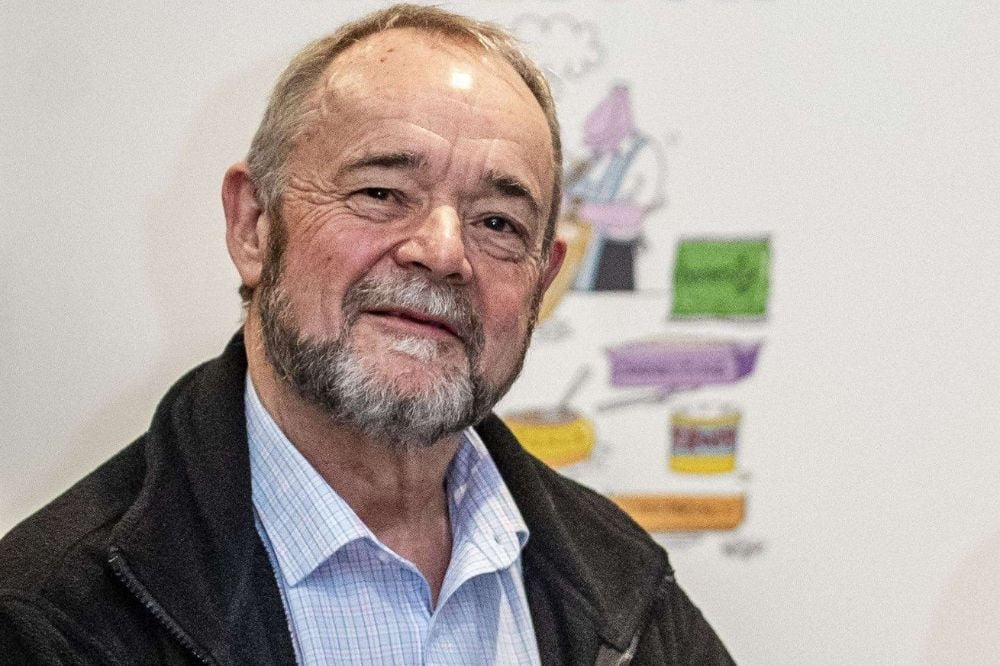2024
AN AFTERNOON WITH MR. PETER COWLEY.
That led me to the question if all founders could be coachable?

Well, I don’t know the exact answer yet. We’ll see. I guess I have a pretty good sense of that but I am about to share it at the end of my blogpost. Personally speaking, I do believe that business history or generative writing will review it, writing a lot on this matter in the future. But what about taking this from the start?
A couple of months ago, when I was notified by HeBan, that Peter Cowley would deliver a closed workshop on angel investing, accidentally I thought this was a rare opportunity to learn more about angel investment criteria; one of these significantly outlier workshops -a not to be missed event- that I had to attend because my schedule allowed me to be in Thessaloniki. In the beginning, during, but mainly after the 3.5-hour training session from Mr Cowley’s overview, my experience time listening to his business life paradigm was so much aligned with my initial expectations waiting for this keynote.
If, by any chance, I had to use a more personal sentence that would of course underline my feedback, spending a Thursday afternoon with Mr. Cowley, that would be summarized as you can do anything as an angel investor but you cannot optimize everything as a real engager. On the other hand, if your path is more difficult, that means your call to action as an invested investor is higher. So, for me this is it – if you know that you are getting restless as a free spirit, as an entrepreneurial individual who constantly wants to venture/attempt, then Introduction to Business Angel Investing Workshop was the most fascinating and rewarding training outline I have ever listened to this field from a 75+ tech startups angel investor.
As Peter Cowley perfectly describes in his book The Invested Investor this “angel thing” sounds interesting but it is something we must give it time. The angel investment journey is long, probably long enough, it’s as prone to the latest trends as anything else in life, so we have to be very selective when it comes to backing tech startup founders or in other words “lose money” because that’s the absolute qualitative percentage of the most cases. Since the dot-com bubble burst, we need to screen more appropriately any kind of “next big thing” if we don’t want to just burn money but have some prolific earnouts. Especially in the era of Artificial Intelligence, where everything seems to change. LTV to CAC and the opposite is among the premium criteria to understand the importance of the invested business when it comes to supporting a startup founder because this is also the fundamental concept of Churn Rate (how quickly customers are lost) which is a metric quite evidence regarding customer acquisition.
That’s good, but it’s still technical, among dozens of financial, logistical, technological, operational, organizational and go-to-market fit elements that have to be checked during the -3 to 6 month period- Due Diligence involvement of ours, as it apparently ought to be if we want to dilute the high-risk investment (if there is a kind of minimization factor, which I fully doubt it) of the potential backing decision we are willing to proceed as angel investors but also as investors in general too; that’s a common rule I suppose. For me, our lives are shaped by what we love; and angel investing in tech startups is one of these kinds of engagements. But bear in mind, in the end, it has to do with actual money. Money well spent in a way. One thing is for sure. There is no such thing as a one-time exit. Baby steps in angel investing are the stepping stone for setting up a truly productive and patient-building portfolio that will flourish in the long run. In the long run, I may mean 10 years! Do you handle this? If you are going to start investing less than 15% of your very well total deserved wealth yours that’s ok but still with an individual/family ROI question mark. Otherwise, business angel investing might reflect your lifestyle, and your wealth and I would also add even your (mental) health.
According to Peter Cowley, there is a fiscal responsibility which highly evolves a risk appetite.
A risk that is willing to cultivate a shareable knowledgeable trust when an angel investor is going to source and lead a deal to invest in people. Yes, that’s correct. We invest in people. Not in products (sometimes there isn’t a product too, only an idea stage, or nothing at all just a charismatic storyteller who happens to transition himself as a founder, even a pivotable pitch deck). At least for the first rounds. There are some cases, some exceptions in particular that could be challenged but these are very few.
Planning, coaching, mentoring, personal dynamics, active listening, transparency, entrepreneurship journey, and matchmaking are some of the emphasizing skills that actually arise and connect simultaneously the building character of the startup founder. I have to say, I fully agree with Peter. There is also another crucial characteristic which is a very good one; what is the driving force for a good founder to proceed and elaborate across the journey? Sometimes, it takes longer to find out, at least for the exit scenario, if there is such a route. This brings us to the conclusion, is there a good “exit” founder under a coachable mentality without a talented team to surround him? Probably not. Once you act as an investor who starts building a portfolio company you have to continue sharing this vision with other true believers who are on board.
Angel investing is not an emotional “sport”.
Well, it shouldn’t be. It doesn’t have to be and that’s difficult. True. Liquidity vs psychology is a disconnecting conflict for angel investors. One of the most crucial and measurable indicators is how we can understand the value and not specifically the price. A truly wise thought, if you think about it. Of course, we will measure the KPI tracking, the financials, the ROI, the gross margin, and all the P&L stuff required. But being an invested investor is not easy and takes hard work while he/she has a lot to learn to give back, setting and developing a set of investment criteria that works for you as an investor and only you, making sure you understand the risks associated with early-stage investing. Therefore, pre-money and post-money valuations are basically a very subject matter figure that has to be taken seriously under consideration when it comes to further investments, down rounds, early exits or IRR exits. My two cents on this are that there isn’t such thing as a startup valuation if the founder doesn’t have from day one a clear short-term monetization plan which doesn’t include technology or product aspects but only business/financial wise revenue. At the end of the day, it is about making money and not creating ways just to inject capital. A big debate on this, but I am sure many of our guest bloggers will contribute or even challenge this hypothesis of mine with their opinions.
Last but not least, just before completing Peter’s book, Takeaways and Templates on page 238, is the most basic principle guide I would recommend to anyone who is involved in angel investing or willing to do so. It is an excellent beginning when you screen a startup. And then go back and start reading the whole book. But I would also add the following; besides that, you have to screen yourself before screening anyone else who needs your money to back a business. The Invested Investor is a very easygoing book with premium but simplified knowledge for someone who wants to embrace change in the startup ecosystem.
I wouldn’t say that all founders maintain this coachable horizon.
That’s something we need to accept, trying to figure out possible ways of helping them to overcome it. On the other hand, the coachable founders, these guys are the most backed ones. How about some extra food for thought (another dimension) by saying how many of the angel investors could also be coachable? This is something extremely important for us in SSPV Capital when we are also screening potential angel investors to join us as stakeholders in the firm. I would like to see more coachable investors, that’s a fact. A fun one!
I wouldn’t come to the end of this blog post without mentioning the following; angel investing is about capitalizing money. Correct. However, it is also about inspiring founders and giving ethical values to society by contributing to the various sectors/industries. It has to do with people and not products. It is a way to give back, even if you know that you could receive -as a full-time angel investor like Peter Cowley- 1500 pitch decks per year and only 0,5% of them will be an investable case. It is rather than 1% as a VC investing interest.
Mr. Peter Cowley, it was my pleasure to hear from you. I learned a lot; I mean a lot. Thank you for your time and your transmissible acumen of yours. Looking forward to learning more about angel investing from another keynote speech you will deliver somewhere in Europe. Perhaps at the EBAN annual congress in Tallinn, Estonia? Until the next one.
